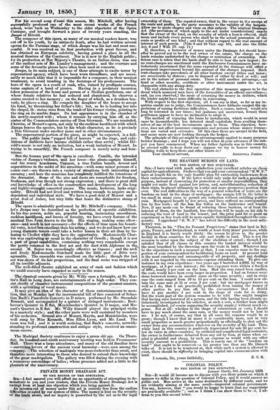THE HEAVIEST BURDEN ON LAND.
TO THE EDITOR. OP THE SPECTATOR.
Sin—I have read with much satisfaction your excellent articles on cheap i
capital for agriculturists. I believe that you and your correspondent "E. W. F." have at length hit on the only feasible plan for extricating landowners from their embarrassments. If the latter would only unite for such a practicable purpose, instead of clamouring for protection or similar impossibilities, they might yet make head against low prices, and, notwithstanding reduction of their rents, be placed ultimately in a safer and more prosperous position than ever. The real difficulties in the way of a general reduction of rents are the burdens on land in-the shape of mortgages : thg margin left by the latter is too small in many cases to permit any reduction without entailing positive ruin. Mortgagees benefit by low prices, and have suffered no corresponding loss by free trade; all the leas has fallen on the landowner and tenant. Now if any mode can be found of reducing those burdens, or at least the interest of them, for the landlord, leas objection will be made on his side to reducing the rent of land to the tenant, and the price paid for so great au experiment as free trade will be more equally distributed throughout the com- munity. I apprehend "E. W. F." has solved the difficulty in the most satis- factory way. Thornton, in his "Plea for Peasant Proprietors," states that land in Bel- gium; France, and Switzerland, is worth at least forty years' purchase, while in England it is barely worth thirty : the reason he gives is, the greater facility in those countries for the sale and traffic in land This is not the occasion to enter upon the subject of the abolition of entail ; though I am satisfied that of all classes in this country the landed interest would be the most benefited by the throwing open the trade in land. Whatever may be the objections to such a measure as that, I can conceive none to the sug- gestion of your correspondent for facilitating loans on land. At present land is the moat cumbrous and unmanageable of all property, and any dealings with it are impeded by the enormous expense attending them. To give one instance in my own experience : two years ago I borrowed 4,0001. by way of mortgage, at .5 per cent interest; the law-expenses were within a fraction of 2001., nearly 5 per cent on the loan. Had the sum raised been smaller, the costs would have been even larger in proportion. I had on former occa- sions borrowed money in smaller sums on the same security; and in every case the costs ranged from 10 to 15 per cent on the loan. I could now ob- tain the same sum at 31 or even 3 per cent : but my mortgagee knows as well as I do, that I am practically prohibited from raising the money of other parties to pay him oft,by the circumstance that I should have to pay another 5 per cent in the shape of costs for so doing. But the worst part of the system remains to be told. One might imagine that having i once borrowed of a person, and the title having been already sa- tisfactorily investigated by his solicitor, at such a cost, a further loan might be accomplished, (of course supposing the security ample,) without much ex- pense. Not at all: whether in the shape of commission or costs, I should have to pay much about the same sum, or the money would not be lent to me. I do not, of course, say that in all cases the expense would be so great ; though I know that in many it is considerably more, and in very small properties so much greater proportionally as effectually to shut out the owner from any accommodation whatever on the security of his land. Thus, while land in this country is positively depreciated for sale 25 per cent be- low its value in other countries, by artificial and complicated legal restraints, the owner is furthermore debarred from any aid by loan, at times when ca- pital is plentiful and cheap, by such an expense as would with any other security amount to a prohibition. This is surely one of the "burdens on land ' that ought to be removed—a far greater one than any Mr. Disraeli talks of. It is not to be wondered at, that while such a system is allowed to exist, there should be difficulty in bringing capital into communication with land.


























 Previous page
Previous page